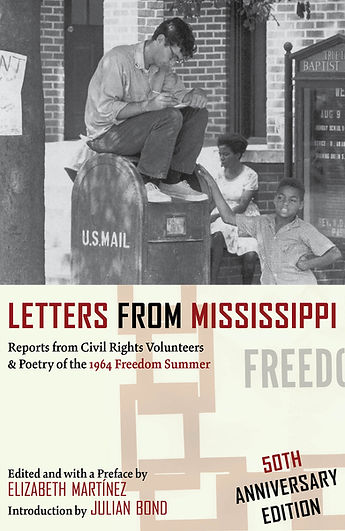Letters from Mississippi and Freedom Summer: 60th anniversary update (Summer 2024)
In 2002, Zephyr Press published our first edition of Letters from Mississippi, which brought a riveting chronicle of Freedom Summer back into print after thirty years. In 2014, our expanded 50th anniversary edition came out and is still in print. Now in 2024, in honor of the 60th anniversary, we are pleased to present a digital version of the book, along with this webpage that provides further background, updated notes on the contributors, and relevant links for this anniversary year.




From Lauderdale County, June 30th, 1964

Dear Stark,
They said that Meridian was an easy town. Comparatively speaking, of course, meaning that the police aren’t altogether that terrible, and they try to hold down the vigilante types. Right now, tho, we’re all sitting here in the office being quietly nervous as hell. This morning Mickey, who’s the project director, and Chaney, a local staff member and Andy, who’s a volunteer, all went out to one of the rougher rural counties to see about a church that was burned down a few days ago. They said they’d be back by four, and now it’s coming on to ten. We’ve been calling the Jackson office all day, and have checked all the jails around, and they’re not in any of them. No word from them of any kind. We’ve had people out looking for them and they haven’t found anything. We’ve been in touch with the FBI and DJ[Department of Justice] but I don’t quite know if they’re doing much of anything. Philadelphia, Miss., that’s where they went to see about the church. The city of brotherly love. Everywhere you go here, there’s hate. Just now when some of us went down the street for coffee, they were followed by a carload of white hoods. Now that we’re back inside, there are two carloads of hoods and one carload, no two, of police, following each other around in low circles outside. Sometimes when the hoods pass they yell something. “White nigger lover” seems to be a favorite. I wish I knew more what the intentions of the police are. In this town, they probably are trying to keep the hoods from shooting us or something, but it’s hard to tell. It’s funny, you know, to come from a place where the police are expected to protect you into one where either you’re not sure or else you know very well they’re against you.
Still no word from the missing people. It must be 11 by now. No one has really said anything about the kinds of things that we’re all thinking could have happened to them. The people who’ve been out looking just came back. Now we talk about the Klan. The FBI is trying to find some grounds to get into the case full strength. Wish they’d hurry up about it.
Hot here, down to 95 now in the office, which is an improvement. Everyone now is very quiet, just sitting, and watching out of the darkened windows a little bit, watching the cars that circle. There’s a couple of people standing around on the corner. One of them is a little kid who gets the license number of the circling cars. Besides that, there’s nothing out there, just a kind of brightly lit street, with the electric wires crisscrossing in front of the window, and the darkness behind you when you sit in the window. Nothing to do but play ping pong or read and wait for the phone to ring. I’ve been reading All Quiet on the Western Front. Somehow it’s appropriate, or maybe not. We’ll see . . .
Love,
Edna

Jim Kates, Zephyr Editor and Freedom Summer Volunteer
Letters from Mississippi began on my mother's dining room table. More generally, it began with part of the strategy for the whole Missisippi Summer Project, organized by the Council of Federated Organizations (COFO) through the Student Nonviolent Co-ordinating Committee (SNCC). Volunteers for what came to be known as "Freedom Summer" were encouraged to write back to our home communities as part of the effort to draw national attention to the local conditions and our work in Mississippi. My own letters were mimeographed and sent out, through the assistance of a local church, to about a hundred people and published in my hometown newspaper.
One of the readers of these letters was an executive with a New York publishing house. It seemed to everyone — especially to me — that one person's letters should not tell the story, and the idea to collect and edit this book was born.
When Letters from Mississippi was first published by McGraw-Hill in 1965, it served as valuable promotion for the Mississippi movement, but it dissatisfied many of the volunteer contributors, because we thought it placed too much emphasis on us — the outsiders — and not enough on the communities within which we worked, who were the real heroes of the story.
Read the full history here, under the section"Why Zephyr?," beneath the Media and Praise sections.
Learn more about Jim at his website: jkates.net
Who Wrote The Letters?
If you have updated info or are a contributor and would like to change your bio, please contact us at editor@zephyrpress.com



